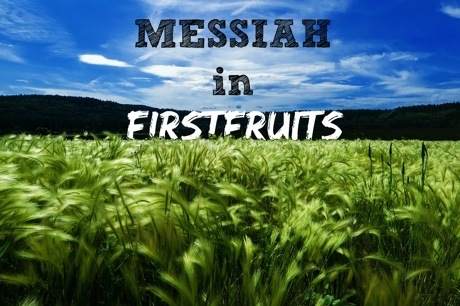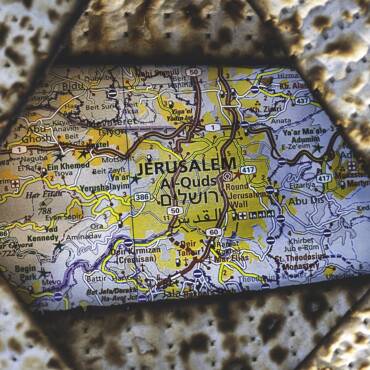Messiah in the Feast of Firstfruits

By Sam Nadler
As we prepare for the Feast of Passover, many people ask about the parallels between Passover and Easter. But are you also aware of the biblical feast of Firstfruits? The Feast of Firstfruits illustrates Messiah’s resurrection in light of Passover, thus disclosing the Resurrection in its proper biblical context. Firstfruits originates in the Torah of Moses, and although the command was given in the wilderness, it was not to be celebrated until the people entered the Land:
Then the LORD spoke to Moses, saying, “Speak to the sons of Israel and say to them, when you enter the land which I am going to give to you and reap its harvest, then you shall bring in the sheaf of the first fruits of your harvest to the priest. He shall wave the sheaf before the LORD for you to be accepted; on the day after the Sabbath the priest shall wave it. Now on the day when you wave the sheaf, you shall offer a male lamb one year old without defect for a burnt offering to the LORD. Its grain offering shall then be two-tenths of an ephah of fine flour mixed with oil, an offering by fire to the LORD for a soothing aroma, with its drink offering, a fourth of a hin of wine. Until this same day, until you have brought in the offering of your God, you shall eat neither bread nor roasted grain nor new growth. It is to be a perpetual statute throughout your generations in all your dwelling places.” (Leviticus 23:9-14)
Two Firstfruits
The Scriptures speaks of two “Firstfruits” festivals, the first being at Passover, and the second fifty days later on Pentecost (Shavuot in Hebrew). During the Feast of Unleavened Bread and at the end of the Sabbath which fell on Passover, people were delegated to go into different barley fields after sunset and obtain samples from each field. The barley for the Passover “Firstfruits” offering (Reishit in Hebrew) was laid together in a sheaf (an omer), and brought to the court of the Temple. There, the grain was winnowed, parched, and bruised in a mortar. The next morning after some incense had been sprinkled on the sheaf, the priest waved it before the Lord towards the four different points of the compass. He then took a part of the grain and threw it into the fire of the altar. Once the offering was accepted, the remainder of the harvest was then acceptable before God (Leviticus 23:11-14).
Firstfruits: A Type of the Resurrection
We know that Yeshua died as our Passover Lamb, and through Him we have redemption and forgiveness (John 1:29; 1 Corinthians 5:7, etc.); the Feast of Firstfruits is observed the day after the Sabbath of the Passover week (Lev. 23:11). Early Sunday morning when the priests in the Temple were offering up the Firstfruits of the barley harvest, our Messiah and High Priest was raised from the dead, offering up Himself as our atonement, and in so doing, became the Firstfruits of the rest of the harvest of believers in Him. Therefore Paul writes, “But now Messiah has been raised from the dead, the Firstfruits of those who are asleep. For since by a man came death, by a man also came the resurrection of the dead. For as in Adam all die, so also in Messiah all will be made alive. But each in his own order: Messiah the Firstfruits, after that those who are Messiah’s at His coming” (1 Cor.15:20-23).
Firstfruits: A New Life
Just as Firstfruits was celebrated only after entering the Promised Land (Leviticus 23:10), so also Messiah’s resurrection looks to life beyond this ‘wilderness journey’ of struggle. This resurrection life cannot be understood while in the bondage of sin. In fact, it wasn’t until after Firstfruits was observed that the new growth of grain could be eaten. Likewise, it wasn’t until after Messiah’s resurrection that believers could fully partake of the new growth, even the new life in Him. It was only after He had been raised and ascended to the Father that we received “the Firstfruits of the Holy Spirit” (Romans 8:23). Firstfruits gave assurance that the rest of the harvest would be accepted: “He shall wave the sheaf before the LORD for you to be accepted” (Leviticus 23:11). Firstfruits is a type of our Savior’s resurrection which guarantees our eternal hope in Messiah. The waving of the sheaf sanctified the whole harvest (see Romans 11:16). Messiah’s resurrection is proof that God accepted His sacrifice for our sins, and that the rest of the harvest is accepted in Him as well!
He who was delivered over because of our transgressions, and was raised because of our justification. (Romans 4:25)
Who is the one who condemns? Messiah Yeshua is He who died, yes, rather who was raised, who is at the right hand of God, who also intercedes for us. (Romans 8:34)
And raised us up with Him, and seated us with Him in the heavenly places in Messiah Yeshua. (Ephesians 2:6)
This hope we have as an anchor of the soul, a hope both sure and steadfast and one which enters within the veil, where Yeshua has entered as a forerunner for us.” (Hebrews 6:19,20)
First Things first!
The yearly festival of Easter, after much historic debate, came to be observed by the western church in connection with the spring solstice and not in accordance with the Jewish Passover. Every so often, this also can lead to confusing results. For example during one year, Easter fell at the end of March, and Passover did not arrive until the end of April – a whole month later! In other words, Messiah’s resurrection was observed four weeks earlier than His death! Obviously, you can’t separate the observance of His death from the observance of His resurrection and expect to make any biblical sense out of it. Little wonder then that Jewish people find it impossible to relate to Easter celebrations from a Jewish perspective. However, if Messiah’s resurrection is identified with Firstfruits, then it can be seen in its proper biblical context. Thus it has proper biblical meaning and becomes the witness that Scripture intended it to be.
It’s Harvest Time!
As we look at Passover week, we see the work of God for His people as He reveals our need for salvation, and provides assurance of eternal life for those who trust in Messiah. So this year as we celebrate Passover and our redemption, let us be sure to exalt Messiah as our Firstfruits of the resurrection, and to share with others the Good News of the ‘New Life’ that we have in our Lord!
Learn more about the Feast of Firstfruits with this FREE eBook:
[maxbutton id=”21″ ]



